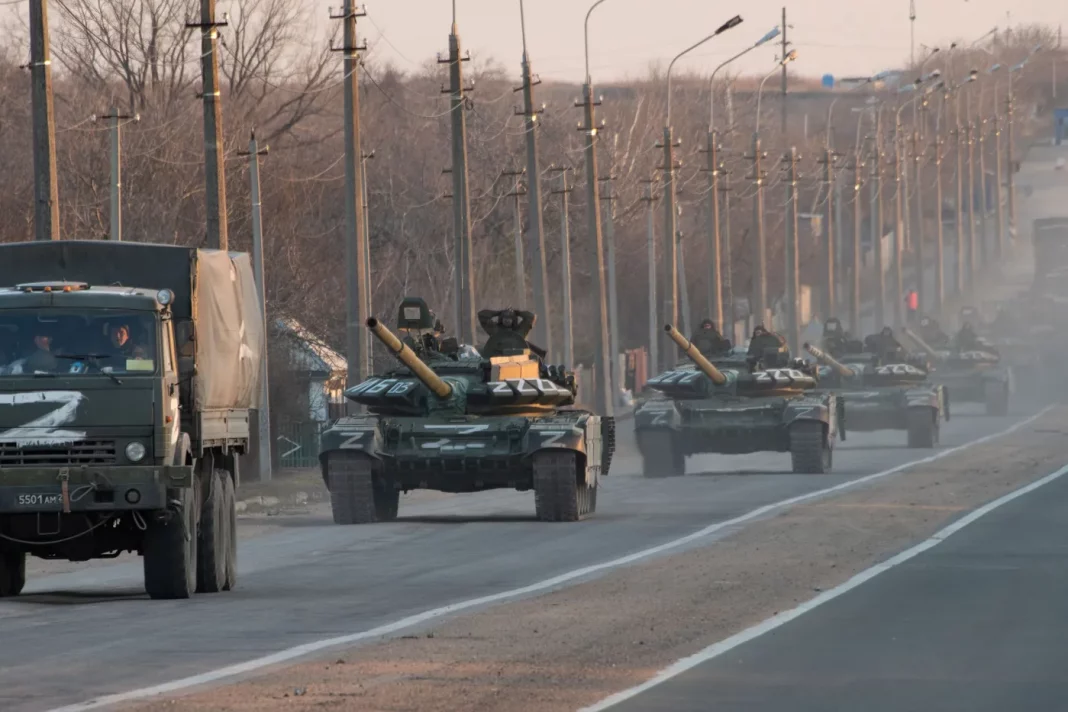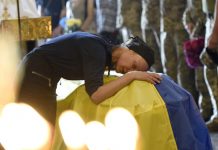By Ben Dubow, for CEPA
Putin’s administration has so bastardized the truth that it can no longer describe events on the battlefield.
Over a year ago, Vladimir Putin launched a “special military operation” to allegedly rid Ukraine of Nazis. According to Putin’s narrative, a fascist regime had been fostered by NATO, armed to the teeth with American weaponry, and was eager to turn against Russian speakers.
For eight years, Russian media painstakingly built this narrative of a Nazi threat on its borders, primarily through disinformation, albeit with a nod to Ukraine’s remembrance of the World War II nationalist leader, Stepan Bandera, and the early activities of the Azov Battalion.
Then, on May 23, anti-Kremlin ultranationalist — and in part neo-Nazi — militias equipped with armored vehicles confirmed by Western media to be American, infiltrated the Russian oblast of Belgorod. The groups left and then returned on June 1, causing continuing mayhem in border regions. It seemed a golden opportunity for Russian media and politicians to validate their narrative.
However, data from Omelas, an intelligence firm (where the author serves as chief technology officer), reveals that mentions of Nazis in Russian media and among politicians actually declined during the week of the incursion.
Why? “Denazification” required linguistic Nazification — that is, the redefinition of Nazi from national socialist to encompass any opponent of Kremlin policy. (Duma members still called their Ukrainian adversaries Nazis 200 times on their official accounts last week.) So the Russian leadership finds itself in a bind; struggling to distinguish true neo-Nazis from Ukraine’s evolving liberal democracy. The Russian worldview has diverged so significantly from reality, that even when a rare event mirrors their projection, it remains unnoticed.
Putin initiated his rule with a manifesto pledging to revive the “Russian Idea”, a historical narrative attributing a messianic quality to Russia and its people as the vanguard against past and future world conquerors, from Genghis Khan to Napoleon and Hitler. In Putin’s conception, today’s world conquerors are the United States and its allies. The spread of American cultural and military influence, especially in territories once within Russia’s sphere of influence, presents an existential threat to the world, and only Russia can rise to the challenge.
While controversial American military campaigns in the early 2000s helped to make that case, placing Ukraine as the new frontline in the battle demanded a significant shift in definitions. Ukraine was redefined from a sovereign nation with an independent history to an administrative subdivision of Russia, created as a weapon to be wielded by the country’s shadowy puppet masters.
To make clear the pure evil being injected into “historic Russian lands,” the propagandists drew on analogies to the Nazis, the last great opponent defeated by Russian arms. Despite Ukraine’s Jewish president, prime minister, and defense minister, its opposition to Kremlin subjugation was enough to brand the government as Nazi.
The pervasive belief among Russian leaders and propagandists is that “objectivity is a myth”, and the truth is unknowable since it is merely an expression of power. This has allowed the flourishing of narratives that frame Russia as a messianic nation under constant threat from malign outside forces. However, because these narratives are detached from reality, inevitably they clash with it, a lesson Russian regimes have learned in the past through follies like Soviet-era Lysenkoism, which condemned millions to starvation through the belief that genetics was merely a bourgeois claim to power.
Russian soldiers, apparently unversed in the exotic postmodern theories that underpin Russian propaganda, were shocked to find no Ukrainian Nazis by any normal definition of the term, but rather ethnic Russians defending a freer lifestyle. Russian intelligence agents assumed the war would end in a few days on the faulty assumption that the Ukrainian people were waiting for an opportune moment to overthrow their Nazi oppressors.
Russian propaganda has built a false narrative around Ukraine for nearly a decade, prioritizing the reinforcement of the Kremlin’s power over factual representation. When the neo-Nazi incursion materialized, they failed to recognize it for what it was, treating it as just another event in the ongoing special military operation.
This self-inflicted inability to adjust narratives in light of reality is a symptom of authoritarian decline, a path that diverges from the self-correcting nature of democracies. Without a return to reason, Russia will continue down the road of reality denial until it meets a truth so serious it threatens the regime’s continuation.
By Ben Dubow, for CEPA
Ben Dubow is a Nonresident Fellow at CEPA and the founder of Omelas, which specializes in data and analysis on how states manipulate the web.





